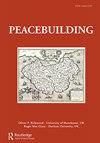Civility as collective self-care in Nablus (Palestine): face-to-face interactions in the shadow of war
IF 1.4
3区 社会学
Q2 INTERNATIONAL RELATIONS
引用次数: 0
Abstract
ABSTRACT The inhabitants of the Palestinian city of Nablus in the West Bank, which has been under Israeli military rule since 1967, practice bottom-up civility to shape public life in spite of political rights being denied to them. As most institutional forms of ‘civil society’ are deeply distrusted, everyday civility among Palestinians dynamically reacts to occurrences of political violence. Based on ethnographic fieldwork in Nablus in 2013 and 2014, this article argues that bottom-up civility constitutes a medium for addressing ethical and political questions about how to live together in dignity in the midst of a repressive and opaque political landscape. As such, civility can be understood as a form of collective ethical self-care. People laterally discipline one another to embody dignity and piety in their face-to-face interactions and to express respect for victims by hiding signs of consumption and market transactions. In an enclosed community facing repression, ethical claims about dignity and civility in public interactions are a form of political agency that calls for decentering common understandings of civil society.纳布卢斯(巴勒斯坦)作为集体自我照顾的文明:战争阴影下的面对面互动
摘要自1967年以来一直处于以色列军事统治之下的约旦河西岸巴勒斯坦城市纳布卢斯的居民,尽管政治权利被剥夺,但他们仍以自下而上的文明来塑造公共生活。由于大多数“公民社会”的制度形式都不受信任,巴勒斯坦人的日常文明对政治暴力的发生会做出动态反应。本文基于2013年和2014年纳布卢斯的民族志实地调查,认为自下而上的文明构成了一种媒介,可以解决道德和政治问题,即如何在压抑和不透明的政治环境中有尊严地生活在一起。因此,文明可以被理解为集体道德自我照顾的一种形式。人们相互横向约束,在面对面的互动中体现尊严和虔诚,并通过隐藏消费和市场交易的迹象来表达对受害者的尊重。在一个面临镇压的封闭社区中,在公共互动中对尊严和文明的道德要求是一种政治机构形式,要求对公民社会达成体面的共识。
本文章由计算机程序翻译,如有差异,请以英文原文为准。
求助全文
约1分钟内获得全文
求助全文

 求助内容:
求助内容: 应助结果提醒方式:
应助结果提醒方式:


